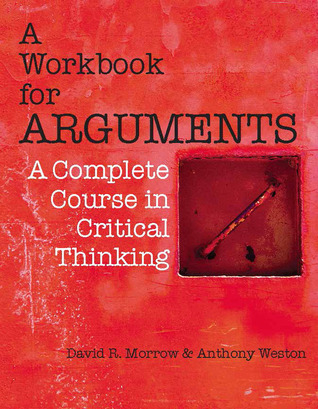BreakawayIndividual.com
Zy Marquiez
February 14, 2020
Having read A Rulebook For Arguments by Anthony Weston and finding it quite useful, the prospect of reading a book along very similar lines but offering more expanded thought seemed quite intriguing. Thankfully, the following book delivered in spades.
A Workbook For Arguments – A Complete Course In Critical Thinking by David R. Morrow & Anthony Weston is a very comprehensive and incisive foray into what it takes to create a critical thinking mind, and how to employ it effectively as well.
Not only does A Workbook For Arguments contain the text from A Rulebook For Arguments with further extensions which help the reader become more robust with the content further broken down, but it also features simple and yet acute advice for the individual to become more apt in argumentation.
In conjunction with that, the authors break down about half the exercises in the book with model responses in the back of the book. Most of these exercise detail real world dilemmas one is likely to hear quite often, detailing the pros and cons of whatever answers were employed, and how each of those may affect an individual or society as a whole.
Also included in the book is a rundown of some of the most common fallacies, which is also useful since fallacies are employed far more often than most realize, and aren’t really taught in school, when in all actuality they should be. Knowing these fallacies is vital to understand not only someone else’s argument and their inherent flaws, but also in constructing and fine-tuning one’s own.
Arguably, the most important part of this book is that from the beginning it guides the reader through the steps in constructing a critical argument in a very logical fashion. What’s more, throughout the book, new topics continually build on the prior ones continuing to add layers to the strong foundation the book helps cement from the get go.
Personally, this is the kind of book whose contents should be mandatory to learn in school and should definitely not be overlooked for homeschooling, autodidacts and self-teachers.
Simply stated, anyone who is seeking to employ critical thinking, use logic in argumentation and become more robust in most key aspects of argumentation should get this book, if not file it under careful consideration. If you think about it, even if it was priced at double or triple the price, it would STILL be worth it, because college courses covering the same subject are often more costly, and offer barely a fraction of what’s here, IF they offer anything of such high quality.
Bottom line: get this book. You will not regret it.
______________________________
Author’s Note:
I recently found out, there is in fact a 3rd Edition of the book. I haven’t reviewed it, but I do plan on reading it in the future. I say that just in case anyone is interested in knowing. Whenever I do read it, I will note how much content has been added and/or changed. Until though, I cannot vouch for it, though I wouldn’t be surprised if it was worth the money, considering the quality of work of the authors.
______________________________
Socratic Logic V3.1 by Peter Kreeft Ph.D.
How To Read A Book by Mortimer J. Adler & Charles Van Doren
Philosophy 101b by Peter Kreeft Ph.D.
A Workbook For Arguments – A Complete Course In Critical Thinking by David Morrow
The Imaginative Argument – A Practical Manifesto For Writers By Frank L. Cioffi
The Trivium – The Liberal Arts Of Logic, Grammar & Rhetoric by Sister Mary Joseph Ph.D.
Dumbing Us Down by John Taylor Gatto
Rotten To The Common Core by Dr. Joseph P. Farrell & Gary Lawrence
A Different Kind Of Teacher by John Taylor Gatto
Weapons Of Mass Instruction by John Taylor Gatto
Drilling Through The Core by Sandra Stotski & Contributors
Tavistock Institute: Social Engineering The Masses by Daniel Estulin
Sherlock Holmes – The Complete Stories by Arthur Conan Doyle.
A Mind Of Your Own – The Truth About Depression & How Women Can Heal Their Bodies To Reclaim Their Lives by Dr. Kelly Brogan

